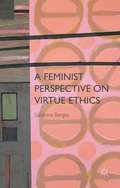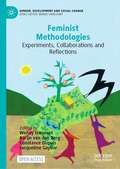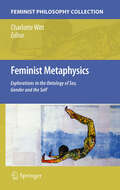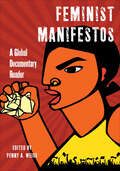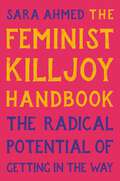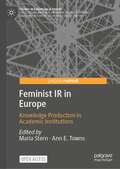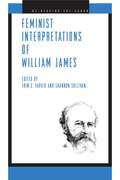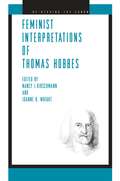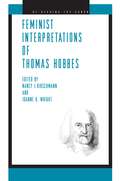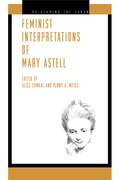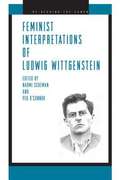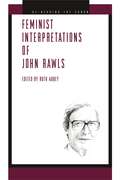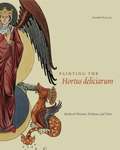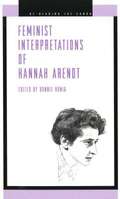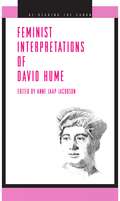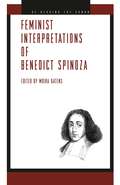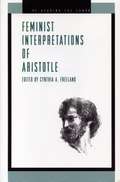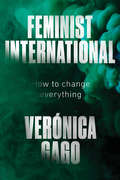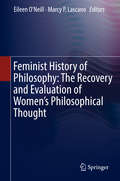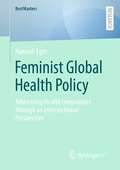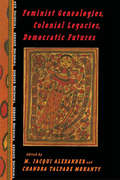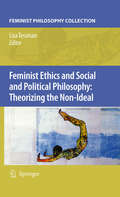- Table View
- List View
A Feminist Perspective on Virtue Ethics
by Sandrine BergesA Feminist Perspective on Virtue Ethics provides of historical survey of feminist virtue ethics, and shows how the ethical theorizing of women in the past can be brought to bear on that of women in the present.
Feminist Methodologies: Experiments, Collaborations and Reflections (Gender, Development and Social Change)
by Wendy Harcourt Karijn van den Berg Constance Dupuis Jacqueline GayborThis open access book gives insights into feminist methodologies in theory and practice. By foregrounding the experiential and embodied nature of doing feminist research, this book offers valuable tools for feminist research as a continuous praxis. Emerging from a rich collective learning process, the collection offers in-depth reflections on how feminists shape research questions, understand positionality, share research results beyond academe and produce feminist intersectional knowledges. This book reveals how the authors navigate theory and practice, candidly exploring the difficulty of producing knowledge on the edge of academia and activism. From different points of view, places and disciplinary positions, artistic and creative experiments and collaborations, the book provides a multi-layered analysis. This book will be a valuable resource and asset to early career researchers and interdisciplinary feminist students who can learn more about the doing of feminist research from realistic, accessible, and practical methodological tools and knowledge.
Feminist Metaphysics
by Charlotte WittThe present volume is an exciting new collection of original essays by outstanding feminist theorists including Sally Haslanger, Marilyn Frye and Linda Alcoff. Feminist Metaphysics is the first collection of articles addressing metaphysical issues from a feminist perspective. The essays cover central feminist topics including: the ontology of sex and gender, persons, identity and subjectivity, and the relations among experience, ideology and reality. Many of the papers combine cutting-edge feminist theory with contemporary metaphysics and the philosophy of language. The volume is also distinctive in including articles representing both analytic and continental perspectives on metaphysics. The essays are philosophically sophisticated and are primarily intended for a professional audience of philosophers and feminist theorists.
Feminist Manifestos: A Global Documentary Reader (Biopolitics)
by Penny A WeissA wide-reaching collection of groundbreaking feminist documents from around the worldFeminist Manifestos is an unprecedented collection of 150 documents from feminist organizations and gatherings in over 50 countries over the course of three centuries. In the first book of its kind, the manifestos are shown to contain feminist theory and recommend actions for change, and also to expand our very conceptions of feminist thought and activism. Covering issues from political participation, education, religion and work to reproduction, violence, racism, and environmentalism, the manifestos together challenge simplistic definitions of gender and feminist movements in exciting ways. In a wide-ranging introduction, Penny Weiss explores the value of these documents, especially how they speak with and to each other. In addition, an introduction to each individual document contextualizes and enhances our understanding of it.Weiss is particularly invested in how communities work together toward social change, which is demonstrated through her choice to include only collectively authored texts. By assembling these documents into an accessible volume, Weiss reveals new possibilities for social justice and ways to advocate for equality.A unique and inspirational collection, Feminist Manifestos expands and evolves our understanding of feminism through the self-described agendas of women from every ethnic group, religion, and region in the world.
The Feminist Killjoy Handbook: The Radical Potential of Getting in the Way
by Sara AhmedA renowned feminist thinker argues we need to get in the way of happiness, our own and other people&’s, to build a more just world Do you refuse to laugh at offensive jokes? Have you ever been accused of ruining dinner by pointing out your companion&’s sexist comment? Are you often told to stop being so &“woke&”? If so, you might be a feminist killjoy—and this handbook is for you. In this book, feminist theorist Sara Ahmed shows how killing joy can be a radical world-making project. Presenting sharp analysis of literature, film, and influential feminist works, and drawing on her own experiences as a queer feminist scholar-activist of color, Ahmed reveals the invaluable lessons of the feminist killjoy, from the importance of asking questions to the power of the eye roll. The Feminist Killjoy Handbook offers an outstretched hand to feminist killjoys everywhere and an essential intellectual guide to the transformative power of getting in the way.
Feminist IR in Europe: Knowledge Production in Academic Institutions (Trends in European IR Theory)
by Maria Stern Ann E. TownsThe aim of this open access book is to take stock of, critically engage, and celebrate feminist IR scholarship produced in Europe. Organized thematically, the volume highlights a wealth of excellent scholarship, while also focusing on the politics of location and the international political economy of feminist knowledge production. Who are some of the central feminist scholars located in Europe? How might the concentration of these scholars in Northern Europe and the UK shape the contents of their scholarship? What have some of the main contributions been, in the study of the following themes: security; war and military; peace; migration; international political economy and development; foreign policy; diplomacy; and global governance and international organizations? The volume offers both an intellectual history and a sociology of feminist IR scholarship in Europe. It showcases the vitality and breadth of feminist IR traditions, while simultaneously calling attention to their partial nature, exclusions and silences.
Feminist Interpretations of William James (Re-Reading the Canon)
by Shannon Sullivan Erin C. TarverWidely regarded as the father of American psychology, William James is by any measure a mammoth presence on the stage of pragmatist philosophy. But despite his indisputable influence on philosophical thinkers of all genders, men remain the movers and shakers in the Jamesian universe—while women exist primarily to support their endeavors and serve their needs. How could the philosophy of William James, a man devoted to Victorian ideals, be used to support feminism? Feminist Interpretations of William James lays out the elements of James’s philosophy that are particularly problematic for feminism, offers a novel feminist approach to James’s ethical philosophy, and takes up epistemic contestations in and with James’s pragmatism. The results are surprising. In short, James’s philosophy can prove useful for feminist efforts to challenge sexism and male privilege, in spite of James himself.In this latest installment of the Re-Reading the Canon series, contributors appeal to William James’s controversial texts not simply as an exercise in feminist critique but in the service of feminism.Along with the editors, the contributors are Jeremy Carrette, Lorraine Code, Megan Craig, Susan Dieleman, Jacob L. Goodson, Maurice Hamington, Erin McKenna, José Medina, and Charlene Haddock Seigfried.
Feminist Interpretations of William James (Re-Reading the Canon)
by Erin C. Tarver Shannon SullivanWidely regarded as the father of American psychology, William James is by any measure a mammoth presence on the stage of pragmatist philosophy. But despite his indisputable influence on philosophical thinkers of all genders, men remain the movers and shakers in the Jamesian universe—while women exist primarily to support their endeavors and serve their needs. How could the philosophy of William James, a man devoted to Victorian ideals, be used to support feminism? Feminist Interpretations of William James lays out the elements of James’s philosophy that are particularly problematic for feminism, offers a novel feminist approach to James’s ethical philosophy, and takes up epistemic contestations in and with James’s pragmatism. The results are surprising. In short, James’s philosophy can prove useful for feminist efforts to challenge sexism and male privilege, in spite of James himself.In this latest installment of the Re-Reading the Canon series, contributors appeal to William James’s controversial texts not simply as an exercise in feminist critique but in the service of feminism.Along with the editors, the contributors are Jeremy Carrette, Lorraine Code, Megan Craig, Susan Dieleman, Jacob L. Goodson, Maurice Hamington, Erin McKenna, José Medina, and Charlene Haddock Seigfried.
Feminist Interpretations of Thomas Hobbes
by Nancy J. Hirschmann Joanne H. WrightFeminist Interpretations of Thomas Hobbes features the work of feminist scholars who are centrally engaged with Hobbes’s ideas and texts and who view Hobbes as an important touchstone in modern political thought. Bringing together scholars from the disciplines of philosophy, history, political theory, and English literature who embrace diverse theoretical and philosophical approaches and a range of feminist perspectives, this interdisciplinary collection aims to appeal to an audience of Hobbes scholars and nonspecialists alike. As a theorist whose trademark is a compelling argument for absolute sovereignty, Hobbes may seem initially to have little to offer twenty-first-century feminist thought. Yet, as the contributors to this collection demonstrate, Hobbesian political thought provides fertile ground for feminist inquiry. Indeed, in engaging Hobbes, feminist theory engages with what is perhaps the clearest and most influential articulation of the foundational concepts and ideas associated with modernity: freedom, equality, human nature, authority, consent, coercion, political obligation, and citizenship. Aside from the editors, the contributors are Joanne Boucher, Karen Detlefsen, Karen Green, Wendy Gunther-Canada, Jane S. Jaquette, S. A. Lloyd, Su Fang Ng, Carole Pateman, Gordon Schochet, Quentin Skinner, and Susanne Sreedhar.
Feminist Interpretations of Thomas Hobbes (Re-Reading the Canon)
by Nancy J. Hirschmann Joanne H. WrightFeminist Interpretations of Thomas Hobbes features the work of feminist scholars who are centrally engaged with Hobbes’s ideas and texts and who view Hobbes as an important touchstone in modern political thought. Bringing together scholars from the disciplines of philosophy, history, political theory, and English literature who embrace diverse theoretical and philosophical approaches and a range of feminist perspectives, this interdisciplinary collection aims to appeal to an audience of Hobbes scholars and nonspecialists alike.As a theorist whose trademark is a compelling argument for absolute sovereignty, Hobbes may seem initially to have little to offer twenty-first-century feminist thought. Yet, as the contributors to this collection demonstrate, Hobbesian political thought provides fertile ground for feminist inquiry. Indeed, in engaging Hobbes, feminist theory engages with what is perhaps the clearest and most influential articulation of the foundational concepts and ideas associated with modernity: freedom, equality, human nature, authority, consent, coercion, political obligation, and citizenship.Aside from the editors, the contributors are Joanne Boucher, Karen Detlefsen, Karen Green, Wendy Gunther-Canada, Jane S. Jaquette, S. A. Lloyd, Su Fang Ng, Carole Pateman, Gordon Schochet, Quentin Skinner, and Susanne Sreedhar.
Feminist Interpretations of Thomas Hobbes (Re-Reading the Canon)
by Nancy J. Hirschmann and Joanne H. WrightFeminist Interpretations of Thomas Hobbes features the work of feminist scholars who are centrally engaged with Hobbes’s ideas and texts and who view Hobbes as an important touchstone in modern political thought. Bringing together scholars from the disciplines of philosophy, history, political theory, and English literature who embrace diverse theoretical and philosophical approaches and a range of feminist perspectives, this interdisciplinary collection aims to appeal to an audience of Hobbes scholars and nonspecialists alike.As a theorist whose trademark is a compelling argument for absolute sovereignty, Hobbes may seem initially to have little to offer twenty-first-century feminist thought. Yet, as the contributors to this collection demonstrate, Hobbesian political thought provides fertile ground for feminist inquiry. Indeed, in engaging Hobbes, feminist theory engages with what is perhaps the clearest and most influential articulation of the foundational concepts and ideas associated with modernity: freedom, equality, human nature, authority, consent, coercion, political obligation, and citizenship.Aside from the editors, the contributors are Joanne Boucher, Karen Detlefsen, Karen Green, Wendy Gunther-Canada, Jane S. Jaquette, S. A. Lloyd, Su Fang Ng, Carole Pateman, Gordon Schochet, Quentin Skinner, and Susanne Sreedhar.
Feminist Interpretations of Mary Astell (Re-Reading the Canon)
by Penny A. Weiss Alice SowaalOften referred to as a proto-feminist, early modern English philosopher and rhetorician Mary Astell was a pious supporter of monarchy who wrote about gender equality at a time when society tightly constrained female agency. This diverse collection of essays situates her ideas in feminist, historical, and philosophical contexts. Focusing on Astell’s work and thought, this book explores the degree to which she can be considered a “feminist” in light of her adherence to Cartesianism, Christian theology, and Tory politics. The contributors explore the philosophical underpinnings of Astell’s outspoken advocacy for the autonomy and education of women; examine the intricacies underlying her theories of power, community, and female resistance to unlawful authority; and reveal the similarities between her own philosophy of gender and sexual politics and feminist theorizing today.A broad-ranging look at one of the most important female writers of the seventeenth and eighteenth centuries, this volume will be especially valuable to students and scholars of feminist history and philosophy and the early modern era.Aside from the editors, the contributors are Kathleen A. Ahearn, Jacqueline Broad, Karen Detlefsen, Susan Paterson Glover, Marcy P. Lascano, Elisabeth Hedrick Moser, Christine Mason Sutherland, and Nancy Tuana.
Feminist Interpretations of Ludwig Wittgenstein (Re-reading the canon)
by Naomi Scheman ; Peg O'ConnorThe original essays in this volume, while written from diverse perspectives, share the common aim of building a constructive dialogue between two currents in philosophy that seem not readily allied: Wittgenstein, who urges us to bring our words back home to their ordinary uses, recognizing that it is our agreements in judgments and forms of life that ground intelligibility; and feminist theory, whose task is to articulate a radical critique of what we say, to disrupt precisely those taken-for-granted agreements in judgments and forms of life. <p><p> Wittgenstein and feminist theorists are alike, however, in being unwilling or unable to "make sense" in the terms of the traditions from which they come, needing to rely on other means—including telling stories about everyday life—to change our ideas of what sense is and of what it is to make it. For both, appeal to grounding is problematic, but the presumed groundedness of particular judgments remains an unavoidable feature of discourse and, as such, in need of understanding. For feminist theory, Wittgenstein suggests responses to the immobilizing tugs between modernist modes of theorizing and postmodern challenges to them. For Wittgenstein, feminist theory suggests responses to those who would turn him into the "normal" philosopher he dreaded becoming, one who offers perhaps unorthodox solutions to recognizable philosophical problems. <p> In addition to an introductory essay by Naomi Scheman, the volume’s twenty chapters are grouped in sections titled "The Subject of Philosophy and the Philosophical Subject," "Wittgensteinian Feminist Philosophy: Contrasting Visions," "Drawing Boundaries: Categories and Kinds," "Being Human: Agents and Subjects," and "Feminism’s Allies: New Players, New Games." These essays give us ways of understanding Wittgenstein and feminist theory that make the alliance a mutually fruitful one, even as they bring to their readings of Wittgenstein an explicitly historical and political perspective that is, at best, implicit in his work. The recent salutary turn in (analytic) philosophy toward taking history seriously has shown how the apparently timeless problems of supposedly generic subjects arose out of historically specific circumstances. These essays shed light on the task of feminist theorists—along with postcolonial, queer, and critical race theorists—to (in Wittgenstein’s words) "rotate the axis of our examination" around whatever "real need[s]" might emerge through the struggles of modernity’s Others. <p> Contributors (besides the editors) are Nancy E. Baker, Nalini Bhushan, Jane Braaten, Judith Bradford, Sandra W. Churchill, Daniel Cohen, Tim Craker, Alice Crary, Susan Hekman, Cressida J. Heyes, Sarah Lucia Hoagland, Christine M. Koggel, Bruce Krajewski, Wendy Lynne Lee, Hilda Lindemann Nelson, Deborah Orr, Rupert Read, Phyllis Rooney, and Janet Farrell Smith.
Feminist Interpretations of John Rawls: Feminist Interpretations Of John Rawls (Re-Reading the Canon)
by Ruth AbbeyIn Feminist Interpretations of John Rawls, Ruth Abbey collects eight essays responding to the work of John Rawls from a feminist perspective. An impressive introduction by the editor provides a chronological overview of English-language feminist engagements with Rawls from his Theory of Justice onward. Abbey surveys the range of issues canvassed by feminist readers of Rawls, as well as critics’ wide disagreement about the value of Rawls’s corpus for feminist purposes. The eight essays that follow testify to the continuing ambivalence among feminist readers of Rawls. From the perspectives of political theory and moral, social, and political philosophy, the contributors address particular aspects of Rawls’s work and apply it to a variety of worldly practices relating to gender inequality and the family, to the construction of disability, to justice in everyday relationships, and to human rights on an international level. The overall effect is to give a sense of the broad spectrum of possible feminist critical responses to Rawls, ranging from rejection to adoption.Aside from the editor, the contributors are Amy R. Baehr, Eileen Hunt Botting, Elizabeth Brake, Clare Chambers, Nancy J. Hirschmann, Anthony Simon Laden, Janice Richardson, and Lisa H. Schwartzman.
Feminist Interpretations of John Rawls (Re-Reading the Canon)
by Ruth AbbeyIn Feminist Interpretations of John Rawls, Ruth Abbey collects eight essays responding to the work of John Rawls from a feminist perspective. An impressive introduction by the editor provides a chronological overview of English-language feminist engagements with Rawls from his Theory of Justice onward. Abbey surveys the range of issues canvassed by feminist readers of Rawls, as well as critics’ wide disagreement about the value of Rawls’s corpus for feminist purposes. The eight essays that follow testify to the continuing ambivalence among feminist readers of Rawls. From the perspectives of political theory and moral, social, and political philosophy, the contributors address particular aspects of Rawls’s work and apply it to a variety of worldly practices relating to gender inequality and the family, to the construction of disability, to justice in everyday relationships, and to human rights on an international level. The overall effect is to give a sense of the broad spectrum of possible feminist critical responses to Rawls, ranging from rejection to adoption.Aside from the editor, the contributors are Amy R. Baehr, Eileen Hunt Botting, Elizabeth Brake, Clare Chambers, Nancy J. Hirschmann, Anthony Simon Laden, Janice Richardson, and Lisa H. Schwartzman.
Feminist Interpretations of John Locke
by Nancy J. Hirschmann Kirstie M. McclureThis collection considers one of the most important figures of the modern canon of political philosophy, John Locke. A physician by training and profession, Locke not only wrote one of the most important and well-known treatises of the modern canon, but also made important contributions in the areas of seventeenth-century law and public policy, epistemology, philosophy of language, religion, and economics. There has been a long-standing debate in feminist scholarship on Locke as to whether this early founder of modern liberal thought was a strong feminist or whether he ushered in a new, and uniquely modern, form of sexism. The essays grapple with this controversy but also move beyond it to the meaning of gender, the status of femininity and masculinity, and how these affect Locke’s construction of the state and law. The volume opens with three of the early “classic” feminist essays on Locke and follows them with reflective essays by their original authors that engage Locke with issues of globalization and international justice. Other essays examine Locke’s midwifery notes, his treatise on education, his writings on Christianity, his contributions to poor-law policy, his economic writings, and his Essay Concerning Human Understanding. In addition to essays by leading feminist theorists, the volume also includes essays by some leading Locke scholars for whom gender is not normally a primary focus, so that the volume should speak to a wide range of scholarly interests and concerns. Besides the editors, the contributors are Teresa Brennan, Melissa Butler, Terrell Carver, Carole Pateman, Carol Pech, Gordon Schochet, Mary Lyndon Shanley, Jeremy Waldron, Joanne Wright, and Linda Zerilli.
Feminist Interpretations of Hannah Arendt (Re-reading the Canon)
by Bonnie HonigConsisting almost entirely of new essays specially prepared for this volume, Feminist Interpretations of Hannah Arendt illuminates the diversity of contemporary feminisms while also generating new and suggestive readings of Hannah Arendt's political thought. The contributing authors' shared interest in Arendt provides a ground upon which to work out their disagreements regarding feminist theory and practice. At the same time, their shared commitment to some brand of feminism leads them to engage Arendt on an unusually wide array of issues, such as gender, sexuality, the body, politics, friendship, solidarity, identity, nationalism, and revolution. Recent developments in feminist theory and practice have prompted a reconsideration of Arendt that includes a critical reevaluation of earlier feminist judgments of her work. From feminist perspectives that interrogate, politicize, and historicize—rather than simply redeploy—categories like "woman," "identity," or "experience," Arendt's well-known hostility to feminism and her critical stance toward identitarian and essentialist definitions of "woman" begin to look more like an advantage than a liability. Arendt's famous reluctance to identify herself as a woman and to address women's issues looks less like a personal problem of male-identification and more like a political stand that resists the reach of a symbolic order that seeks to define, categorize, and stabilize her in terms of one essential, unriven, and always known identity. Thus, the volume's authors move beyond feminism's traditional concern with the "woman question" to ask, further, what contemporary feminisms might learn from Arendt's conceptions of politics, action, and identity.
Feminist Interpretations of David Hume (Re-Reading the Canon)
by Anne Jaap JacobsonThis book is the first collection of feminist essays on one of the central figures in the history of English-speaking philosophy. Besides providing a rich variety of feminist viewpoints on a wide range of Hume’s writings, the contributors introduce new themes into the scholarship on Hume, including gendered metaphors in his metaphysical texts, the role of society in the conception of the human mind, and his conception of human nature in relation to recent rejections of essentialism. <p><p> Hume scholarship as a whole still reflects the relative neglect in mainstream analytic philosophy of alternative—and so feminist—perspectives on philosophy. The essays in this volume show that the standard, narrow view of philosophy excludes valuable perspectives. <p> These essays cover a great diversity of subjects in Hume’s work. They discuss his theory of knowledge; his conception of human inquiry and the human mind; his views on our knowledge of the external world and the future; his treatments of the passions, emotions and virtue; his conception of moral education; his views on aesthetics and religion; and his historical work. <p> The contributors, members of philosophy, political science, theology, and English departments, employ a variety of critical techniques. The result is a volume that stands in enlightening contrast to the standard collections on David Hume. <p> Contributors are Annette C. Baier, Jennifer A. Herdt, Nancy J. Hirschmann, Sheridan Hough, Anne Jaap Jacobson, Joyce Jenkins, Genevieve Lloyd, Susan A. Martinelli-Fernandez, Robert Shaver, Aaron Smuts, Christine Swanton, Jacqueline Taylor, Kathryn Temple, and Christopher Williams.
Feminist Interpretations of Benedict Spinoza
by Moira GatensThis volume brings together international scholars working at the intersection of Spinoza studies and critical and feminist philosophy. It is the first book-length study dedicated to the re-reading of Spinoza’s ethical and theologico-political works from a feminist perspective. The twelve outstanding chapters range over the entire field of Spinoza’s writings—metaphysical, political, theological, ethical, and psychological—drawing out the ways in which his philosophy presents a rich resource for the reconceptualization of friendship, sexuality, politics, and ethics in contemporary life. The clear and accessible Introduction offers a historical sketch of Spinoza’s life and intellectual context and indicates how Spinoza’s philosophy might be seen as a rich cultural resource today. Topics treated here include the mind-body problem and its relation to the sex-gender distinction; relational autonomy; the nature of love and friendship; sexuality and normative morality; free will and determinism and their relation to Christian theology; imagination and recognition between the sexes; emotion and the body; and power, imagination, and political sovereignty. The essays engage in a rich and challenging conversation that opens new paths for feminist research. Contributors, besides the editor, are Aurelia Armstrong, Sarah Donovan, Paola Grassi, Luce Irigaray, Susan James, Genevieve Lloyd, Alexandre Matheron, Heidi Ravven, Amelie Rorty, and David West.
Feminist Interpretations Of Aristotle
by Cynthia A. FreelandIn contrast to many previous feminist interpretations of Aristotle, which found much to disparage and little to salvage in his philosophy, the contributors to this volume enter into new, creative, and subtle dimensions of inquiry about Aristotle. They look more deeply into his influence and question the possibility of escape from it. Feminists recognize that they too philosophize within the tradition founded by Plato and Aristotle and owe the Greeks a debt. Aristotle still influences our abstract thinking, search for principles, meditations on virtue, and reflections on nature, essence, and sexual difference. As critics of modernism and liberalism in our day, some feminists seek significant alternatives in the classical era while eschewing ancient sexism. From the essays in this volume, which are divided into two parts, "Theoretical Sciences" and "Practical and Productive Sciences," reflecting the traditional structure of works in the Aristotelian corpus, we learn not only about Aristotle but about a new feminist methodology in approaching major contemporary issues such as surrogate motherhood and women in the military. We also find a new perspective on feminist debates over whether logic is gendered, the advantages of an "ethics of care," feminist epistemology, and the nature of critical feminist spectatorship. Contributors are Angela Curran, Marguerite Deslauriers, Cynthia Freeland, Ruth Groenhout, Marjorie Hass, Linda Hirshman, Luce Irigaray, Barbara Koziak, Deborah Modrak, Martha Nussbaum, Carol Poster, and Charlotte Witt.
Feminist International: How to Change Everything
by Veronica GagoLeader of Latin America&’s powerful new women&’s movement rethinks the meaning of feminist politicsRecent years have seen massive feminist mobilizations in virtually every continent, overturning social mores and repressive legislation. In this brilliant and original look at the emerging feminist international, Verónica Gago explores how the women&’s strike, as both a concept and collective experience, may be transforming the boundaries of politics as we know it.At once a gripping political analysis and a theoretically charged manifesto, Feminist International draws on the author&’s rich experience with radical movements to enter into ongoing debates in feminist and Marxist theory: from social reproduction and domestic work to the intertwining of financial and gender violence, as well as controversies surrounding the neo-extractivist model of development, the possibilities and limits of left populism, and the ever-vexed nexus of gender-race-class. Gago asks what another theory of power might look like, one premised on our desire to change everything.
Feminist History of Philosophy: The Recovery And Evaluation Of Women's Philosophical Thought
by Eileen O’Neill Marcy P. LascanoOver the course of the past twenty-five years, feminist theory has had a forceful impact upon the history of Western philosophy. The present collection of essays has as its primary aim to evaluate past women’s published philosophical work, and to introduce readers to newly recovered female figures; the collection will also make contributions to the history of the philosophy of gender, and to the history of feminist social and political philosophy, insofar as the collection will discuss women’s views on these issues.The volume contains contributions by an international group of leading historians of philosophy and political thought, whose scholarship represents some of the very best work being done in North and Central America, Canada, Europe and Australia.
Feminist Global Health Policy: Addressing Health Inequalities through an Intersectional Perspective (BestMasters)
by Hannah EgerHealth inequalities, primarily driven by the structural determinants of health, are a major concern towards the global goal of health for all. A feminist global health policy has the potential to address the unequal distribution of power and to dismantle these imbalances. The prioritisation of intersectional, holistic, human rights-based approaches intends to advance health equality and reproductive justice. This research examined the contours and potentials of a feminist global health policy by developing a framework. Online focus groups were conducted with participants affiliated to either the global-academic or local-activist level, envisaging global representation. The elaborated framework provides a nexus between the global and the local level, by entailing universal principles as well as recommendations and sensitivity for context-specific adaptations. Community and policymakers are identified as key actors. This research aims to stimulate a debate on feminist global health policy and the potential of this framework with regard to health equality and reproductive justice.
Feminist Genealogies, Colonial Legacies, Democratic Futures (Thinking Gender)
by Chandra Talpade Mohanty M. Jacqui AlexanderFeminist Geneaologies, Colonial Legacies, Democratic Futures provides a feminist anaylsis of the questions of sexual and gender politics, economic and cultural marginality, and anti-racist and anti-colonial practices both in the "West" and in the "Third World." This collection, edited by Jacqui Alexander and Chandra Talpade Mohanty, charts the underlying theoretical perspectives and organization practices of the different varieties of feminism that take on questions of colonialism, imperialism, and the repressive rule of colonial, post-colonial and advanced capitalist nation-states. It provides a comparative, relational, historically grounded conception of feminist praxis that differs markedly from the liberal pluralist, multicultural understanding that sheapes some of the dominant version of Euro-American feminism. As a whole, the collection poses a unique challenge to the naturalization of gender based in the experiences, histories and practices of Euro-American women.
Feminist Ethics and Social and Political Philosophy: Theorizing the Non-Ideal
by Lisa TessmanFeminist Ethics and Social and Political Philosophy: Theorizing the Non-Ideal is a collection of feminist essays that self-consciously develop non-idealizing approaches to either ethics or social and political philosophy (or both). Characterizing feminist ethics and social and political philosophy as marked by a tendency to be non-idealizing serves to thematize the volume, while still allowing the essays to be diverse enough to constitute a representation of current work in the fields of feminist ethics and social and political philosophy. Each of the essays either serves as an instance of work that is rooted in actual, non-ideal conditions, and that, as such, is able to consider any of the many questions relevant to subordinated people; or reflects theoretically on the significance of non-idealizing as an approach to feminist ethics or social and political philosophy. The volume will be of interest to feminist scholars from all disciplines, to academics who are ethicists and political philosophers as well as to graduate students.
